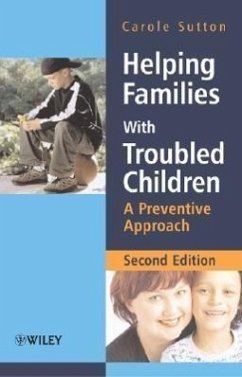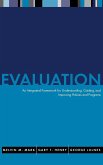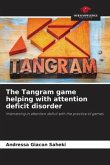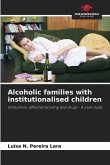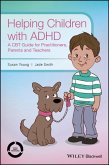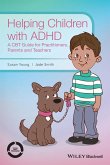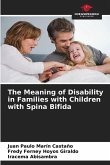- Gebundenes Buch
- Merkliste
- Auf die Merkliste
- Bewerten Bewerten
- Teilen
- Produkt teilen
- Produkterinnerung
- Produkterinnerung
The growing incidence of mental health problems and offending in adolescents suggests that preventive work with parents remains a critical area. This suggestion has been confirmed by longitudinal research that shows, for example, that children whose mothers are stressed in pregnancy are in danger of developing hyperactivity. In Helping Families with Troubled Children, Carole Sutton stresses the importance of working with families before difficult behaviour becomes entrenched and resistant to intervention. This preventive work should take place from pregnancy onwards. Drawing on social learning…mehr
Andere Kunden interessierten sich auch für
![Evaluation Evaluation]() Melvin M MarkEvaluation64,99 €
Melvin M MarkEvaluation64,99 €![The Tangram game helping with attention deficit disorder The Tangram game helping with attention deficit disorder]() Andressa Giacon SahekiThe Tangram game helping with attention deficit disorder26,99 €
Andressa Giacon SahekiThe Tangram game helping with attention deficit disorder26,99 €![Alcoholic families with institutionalised children Alcoholic families with institutionalised children]() Luísa N. Pereira LaraAlcoholic families with institutionalised children26,99 €
Luísa N. Pereira LaraAlcoholic families with institutionalised children26,99 €![Helping Children with ADHD Helping Children with ADHD]() Susan YoungHelping Children with ADHD95,99 €
Susan YoungHelping Children with ADHD95,99 €![I'm Leo, a service dog in a cat jacket, and I'm helping my owner with PTSD I'm Leo, a service dog in a cat jacket, and I'm helping my owner with PTSD]() K. EyckI'm Leo, a service dog in a cat jacket, and I'm helping my owner with PTSD26,99 €
K. EyckI'm Leo, a service dog in a cat jacket, and I'm helping my owner with PTSD26,99 €![Helping Children with ADHD Helping Children with ADHD]() Susan YoungHelping Children with ADHD55,99 €
Susan YoungHelping Children with ADHD55,99 €![The Meaning of Disability in Families with Children with Spina Bifida The Meaning of Disability in Families with Children with Spina Bifida]() Juan Paulo Marín CastañoThe Meaning of Disability in Families with Children with Spina Bifida40,99 €
Juan Paulo Marín CastañoThe Meaning of Disability in Families with Children with Spina Bifida40,99 €-
-
-
The growing incidence of mental health problems and offending in adolescents suggests that preventive work with parents remains a critical area. This suggestion has been confirmed by longitudinal research that shows, for example, that children whose mothers are stressed in pregnancy are in danger of developing hyperactivity. In Helping Families with Troubled Children, Carole Sutton stresses the importance of working with families before difficult behaviour becomes entrenched and resistant to intervention. This preventive work should take place from pregnancy onwards. Drawing on social learning theory and cognitive behavioural principles, Sutton provides a structured approach to intervention (ASPIRE - Assessment, Planning, Implementation, Review and Evaluation). This approach will guide practitioners to work supportively with parents. This second edition has been updated with the latest research findings in a number of areas of children's difficulties. There are specific chapters on sleep problems, anxiety and depression, eating problems, wetting and soiling, serious behaviour problems and ADHD.
Produktdetails
- Produktdetails
- Verlag: Wiley
- 2nd edition
- Seitenzahl: 338
- Erscheinungstermin: 26. Juni 2006
- Englisch
- Abmessung: 229mm x 152mm x 23mm
- Gewicht: 590g
- ISBN-13: 9780470015490
- ISBN-10: 0470015497
- Artikelnr.: 29921798
- Herstellerkennzeichnung
- Libri GmbH
- Europaallee 1
- 36244 Bad Hersfeld
- gpsr@libri.de
- Verlag: Wiley
- 2nd edition
- Seitenzahl: 338
- Erscheinungstermin: 26. Juni 2006
- Englisch
- Abmessung: 229mm x 152mm x 23mm
- Gewicht: 590g
- ISBN-13: 9780470015490
- ISBN-10: 0470015497
- Artikelnr.: 29921798
- Herstellerkennzeichnung
- Libri GmbH
- Europaallee 1
- 36244 Bad Hersfeld
- gpsr@libri.de
Carole Sutton is Associate Director of the Unit for Parenting Studies at De Montfort University. She originally worked as a social worker in the fields of health, mental health and children and families, where her experiences as a practitioner and as a parent led to an interest in preventive work to support young families. She studied for a degree in psychology and then for a doctorate in parent education, working with Professor Martin Herbert. She is a chartered psychologist. This book has grown out of her subsequent experiences of teaching and training professional workers, health visitors, social workers in field and residential settings, psychologists, family therapists, teachers and doctors and supporting parents in helping their troubled children.
Tables and Figures xiii
About the Author xvii
Acknowledgements xviii
Introduction 1
. . . So the grounds for concern are still serious 1
The beginnings of a focus upon prevention 1
Some common themes emerging from the research 3
Dissemination of the necessary skills 7
Part I SOME GENERAL PRINCIPLES FOR HELPING FAMILIES 9
1 Research Concerning Troubled Children 11
The needs of children 11
The nature of children's difficulties 11
Origins of children's difficulties: risk and protective factors 13
The effectiveness of interventions to help children 27
2 Social Learning/Cognitive-behavioural Theory 33
Ways of thinking about human beings 33
A range of perspectives on human beings 36
Exploring principles of cognitive-behavioural theory 45
Making use of principles of cognitive-behavioural theory 54
Summary of some key principles of cognitive-behavioural theory 67
3 Engaging and Supporting Parents and Families 68
Children within a statutory and organisational context 68
How can we best support families? 69
Developing awareness of cultural issues 74
Developing a positive focus 77
Practice issues: the importance of structure 79
Interagency work 81
Methods of giving help: evidence from research 82
4 ASPIRE -- Assessment 84
ASPIRE: a process for practice 84
What is assessment? 85
The steps of assessment - and beyond 90
5 ASPIRE: Planning, Implementation, Review and Evaluation 105
The stage of planning - with parents or caregivers 105
Implementing the plan 119
Reviewing and evaluating the plan 123
Part II HELPING FAMILIES WITH SPECIFIC DIFFICULTIES 129
6 Helping Families with Children Who are Anxious or Depressed 131
Definition of emotional disorders 131
Prevalence of emotional difficulties in children 131
Research into children and anxiety 133
Helping families with anxious children 136
Research into children and depression 148
Helping families with depressed children 151
7 Helping Families with Children's Sleeping Problems 158
Definition of sleeping disorder 158
The prevalence of sleeping/waking difficulties 159
Research into the origins of bedtime and waking problems 161
Research into the management of bedtime and sleep problems 166
Helping families whose children have bedtime/waking problems 170
8 Helping Families with Children with Eating Problems 180
Problems of definition 180
Prevalence of eating/feeding problems 181
Research into the origins of feeding/eating problems 182
Research into the management of eating difficulties 185
Helping families with children with eating difficulties 189
9 Helping Families with Children with Serious Behaviour Problems 198
Difficulties of arriving at definitions 198
Prevalence of and continuities in conduct disorders 199
Research into the origins of conduct disorders 202
Research into intervention in conduct disorders 206
Helping parents with children with serious behaviour problems 209
10 Helping Families with Children with Attention Deficit Hyperactivity
Disorder 224
Difficulties of arriving at definitions and diagnoses 224
Prevalence of ADHD 226
Research into ADHD 227
Research concerning the management of ADHD 228
Research focusing upon organisational strategies 231
Helping parents with children with features of ADHD 232
11 Helping Families whose Children Wet or Soil 244
Enuresis/bed wetting: definition and prevalence 244
Research concerning the origins of bed wetting 244
Research concerning the management of bed wetting 247
Help for families with children who wet the bed 247
Encopresis/soiling 254
Research into the origins of soiling 255
Research into the management of soiling 256
Help for families with children who soil 256
12 Parent Education and Training: Values and Research 263
The value base of the work: ethical issues 263
Support for families in a multicultural society 265
The content and process of effective programmes of parent training 266
Content and characteristics of effective parent education programmes 266
The process and practicalities of parent training 268
Devising agreements to support practice 270
Maintaining the improvement 275
Concluding remarks 276
Appendix 1 Form for assessment of child behaviour difficulty 277
Appendix 2 Form for recording 'life events' for the family and child 282
Appendix 3 Form for obtaining ratings on the life events scale 283
Appendix 4 Form for compiling summary of information relevant to assessment
285
Appendix 5 Form for noting A-B-C sequences 286
Appendix 6 Form for charting behaviours 287
Appendix 7 Form for eight-week charting of positive and negative behaviours
288
Appendix 8 Form for planning with parents 290
Appendix 9 Parenting positively: some notes for parents 291
Appendix 10 Weekly sleep chart 292
Appendix 11 Guidelines for good practice of behavioural and cognitive
psychotherapy 293
Appendix 12 Form for framing an agreement between a worker and a client 298
Appendix 13 Form for framing an agreement in one-to-one or family work 299
References 301
Index 315
About the Author xvii
Acknowledgements xviii
Introduction 1
. . . So the grounds for concern are still serious 1
The beginnings of a focus upon prevention 1
Some common themes emerging from the research 3
Dissemination of the necessary skills 7
Part I SOME GENERAL PRINCIPLES FOR HELPING FAMILIES 9
1 Research Concerning Troubled Children 11
The needs of children 11
The nature of children's difficulties 11
Origins of children's difficulties: risk and protective factors 13
The effectiveness of interventions to help children 27
2 Social Learning/Cognitive-behavioural Theory 33
Ways of thinking about human beings 33
A range of perspectives on human beings 36
Exploring principles of cognitive-behavioural theory 45
Making use of principles of cognitive-behavioural theory 54
Summary of some key principles of cognitive-behavioural theory 67
3 Engaging and Supporting Parents and Families 68
Children within a statutory and organisational context 68
How can we best support families? 69
Developing awareness of cultural issues 74
Developing a positive focus 77
Practice issues: the importance of structure 79
Interagency work 81
Methods of giving help: evidence from research 82
4 ASPIRE -- Assessment 84
ASPIRE: a process for practice 84
What is assessment? 85
The steps of assessment - and beyond 90
5 ASPIRE: Planning, Implementation, Review and Evaluation 105
The stage of planning - with parents or caregivers 105
Implementing the plan 119
Reviewing and evaluating the plan 123
Part II HELPING FAMILIES WITH SPECIFIC DIFFICULTIES 129
6 Helping Families with Children Who are Anxious or Depressed 131
Definition of emotional disorders 131
Prevalence of emotional difficulties in children 131
Research into children and anxiety 133
Helping families with anxious children 136
Research into children and depression 148
Helping families with depressed children 151
7 Helping Families with Children's Sleeping Problems 158
Definition of sleeping disorder 158
The prevalence of sleeping/waking difficulties 159
Research into the origins of bedtime and waking problems 161
Research into the management of bedtime and sleep problems 166
Helping families whose children have bedtime/waking problems 170
8 Helping Families with Children with Eating Problems 180
Problems of definition 180
Prevalence of eating/feeding problems 181
Research into the origins of feeding/eating problems 182
Research into the management of eating difficulties 185
Helping families with children with eating difficulties 189
9 Helping Families with Children with Serious Behaviour Problems 198
Difficulties of arriving at definitions 198
Prevalence of and continuities in conduct disorders 199
Research into the origins of conduct disorders 202
Research into intervention in conduct disorders 206
Helping parents with children with serious behaviour problems 209
10 Helping Families with Children with Attention Deficit Hyperactivity
Disorder 224
Difficulties of arriving at definitions and diagnoses 224
Prevalence of ADHD 226
Research into ADHD 227
Research concerning the management of ADHD 228
Research focusing upon organisational strategies 231
Helping parents with children with features of ADHD 232
11 Helping Families whose Children Wet or Soil 244
Enuresis/bed wetting: definition and prevalence 244
Research concerning the origins of bed wetting 244
Research concerning the management of bed wetting 247
Help for families with children who wet the bed 247
Encopresis/soiling 254
Research into the origins of soiling 255
Research into the management of soiling 256
Help for families with children who soil 256
12 Parent Education and Training: Values and Research 263
The value base of the work: ethical issues 263
Support for families in a multicultural society 265
The content and process of effective programmes of parent training 266
Content and characteristics of effective parent education programmes 266
The process and practicalities of parent training 268
Devising agreements to support practice 270
Maintaining the improvement 275
Concluding remarks 276
Appendix 1 Form for assessment of child behaviour difficulty 277
Appendix 2 Form for recording 'life events' for the family and child 282
Appendix 3 Form for obtaining ratings on the life events scale 283
Appendix 4 Form for compiling summary of information relevant to assessment
285
Appendix 5 Form for noting A-B-C sequences 286
Appendix 6 Form for charting behaviours 287
Appendix 7 Form for eight-week charting of positive and negative behaviours
288
Appendix 8 Form for planning with parents 290
Appendix 9 Parenting positively: some notes for parents 291
Appendix 10 Weekly sleep chart 292
Appendix 11 Guidelines for good practice of behavioural and cognitive
psychotherapy 293
Appendix 12 Form for framing an agreement between a worker and a client 298
Appendix 13 Form for framing an agreement in one-to-one or family work 299
References 301
Index 315
Tables and Figures xiii
About the Author xvii
Acknowledgements xviii
Introduction 1
. . . So the grounds for concern are still serious 1
The beginnings of a focus upon prevention 1
Some common themes emerging from the research 3
Dissemination of the necessary skills 7
Part I SOME GENERAL PRINCIPLES FOR HELPING FAMILIES 9
1 Research Concerning Troubled Children 11
The needs of children 11
The nature of children's difficulties 11
Origins of children's difficulties: risk and protective factors 13
The effectiveness of interventions to help children 27
2 Social Learning/Cognitive-behavioural Theory 33
Ways of thinking about human beings 33
A range of perspectives on human beings 36
Exploring principles of cognitive-behavioural theory 45
Making use of principles of cognitive-behavioural theory 54
Summary of some key principles of cognitive-behavioural theory 67
3 Engaging and Supporting Parents and Families 68
Children within a statutory and organisational context 68
How can we best support families? 69
Developing awareness of cultural issues 74
Developing a positive focus 77
Practice issues: the importance of structure 79
Interagency work 81
Methods of giving help: evidence from research 82
4 ASPIRE -- Assessment 84
ASPIRE: a process for practice 84
What is assessment? 85
The steps of assessment - and beyond 90
5 ASPIRE: Planning, Implementation, Review and Evaluation 105
The stage of planning - with parents or caregivers 105
Implementing the plan 119
Reviewing and evaluating the plan 123
Part II HELPING FAMILIES WITH SPECIFIC DIFFICULTIES 129
6 Helping Families with Children Who are Anxious or Depressed 131
Definition of emotional disorders 131
Prevalence of emotional difficulties in children 131
Research into children and anxiety 133
Helping families with anxious children 136
Research into children and depression 148
Helping families with depressed children 151
7 Helping Families with Children's Sleeping Problems 158
Definition of sleeping disorder 158
The prevalence of sleeping/waking difficulties 159
Research into the origins of bedtime and waking problems 161
Research into the management of bedtime and sleep problems 166
Helping families whose children have bedtime/waking problems 170
8 Helping Families with Children with Eating Problems 180
Problems of definition 180
Prevalence of eating/feeding problems 181
Research into the origins of feeding/eating problems 182
Research into the management of eating difficulties 185
Helping families with children with eating difficulties 189
9 Helping Families with Children with Serious Behaviour Problems 198
Difficulties of arriving at definitions 198
Prevalence of and continuities in conduct disorders 199
Research into the origins of conduct disorders 202
Research into intervention in conduct disorders 206
Helping parents with children with serious behaviour problems 209
10 Helping Families with Children with Attention Deficit Hyperactivity
Disorder 224
Difficulties of arriving at definitions and diagnoses 224
Prevalence of ADHD 226
Research into ADHD 227
Research concerning the management of ADHD 228
Research focusing upon organisational strategies 231
Helping parents with children with features of ADHD 232
11 Helping Families whose Children Wet or Soil 244
Enuresis/bed wetting: definition and prevalence 244
Research concerning the origins of bed wetting 244
Research concerning the management of bed wetting 247
Help for families with children who wet the bed 247
Encopresis/soiling 254
Research into the origins of soiling 255
Research into the management of soiling 256
Help for families with children who soil 256
12 Parent Education and Training: Values and Research 263
The value base of the work: ethical issues 263
Support for families in a multicultural society 265
The content and process of effective programmes of parent training 266
Content and characteristics of effective parent education programmes 266
The process and practicalities of parent training 268
Devising agreements to support practice 270
Maintaining the improvement 275
Concluding remarks 276
Appendix 1 Form for assessment of child behaviour difficulty 277
Appendix 2 Form for recording 'life events' for the family and child 282
Appendix 3 Form for obtaining ratings on the life events scale 283
Appendix 4 Form for compiling summary of information relevant to assessment
285
Appendix 5 Form for noting A-B-C sequences 286
Appendix 6 Form for charting behaviours 287
Appendix 7 Form for eight-week charting of positive and negative behaviours
288
Appendix 8 Form for planning with parents 290
Appendix 9 Parenting positively: some notes for parents 291
Appendix 10 Weekly sleep chart 292
Appendix 11 Guidelines for good practice of behavioural and cognitive
psychotherapy 293
Appendix 12 Form for framing an agreement between a worker and a client 298
Appendix 13 Form for framing an agreement in one-to-one or family work 299
References 301
Index 315
About the Author xvii
Acknowledgements xviii
Introduction 1
. . . So the grounds for concern are still serious 1
The beginnings of a focus upon prevention 1
Some common themes emerging from the research 3
Dissemination of the necessary skills 7
Part I SOME GENERAL PRINCIPLES FOR HELPING FAMILIES 9
1 Research Concerning Troubled Children 11
The needs of children 11
The nature of children's difficulties 11
Origins of children's difficulties: risk and protective factors 13
The effectiveness of interventions to help children 27
2 Social Learning/Cognitive-behavioural Theory 33
Ways of thinking about human beings 33
A range of perspectives on human beings 36
Exploring principles of cognitive-behavioural theory 45
Making use of principles of cognitive-behavioural theory 54
Summary of some key principles of cognitive-behavioural theory 67
3 Engaging and Supporting Parents and Families 68
Children within a statutory and organisational context 68
How can we best support families? 69
Developing awareness of cultural issues 74
Developing a positive focus 77
Practice issues: the importance of structure 79
Interagency work 81
Methods of giving help: evidence from research 82
4 ASPIRE -- Assessment 84
ASPIRE: a process for practice 84
What is assessment? 85
The steps of assessment - and beyond 90
5 ASPIRE: Planning, Implementation, Review and Evaluation 105
The stage of planning - with parents or caregivers 105
Implementing the plan 119
Reviewing and evaluating the plan 123
Part II HELPING FAMILIES WITH SPECIFIC DIFFICULTIES 129
6 Helping Families with Children Who are Anxious or Depressed 131
Definition of emotional disorders 131
Prevalence of emotional difficulties in children 131
Research into children and anxiety 133
Helping families with anxious children 136
Research into children and depression 148
Helping families with depressed children 151
7 Helping Families with Children's Sleeping Problems 158
Definition of sleeping disorder 158
The prevalence of sleeping/waking difficulties 159
Research into the origins of bedtime and waking problems 161
Research into the management of bedtime and sleep problems 166
Helping families whose children have bedtime/waking problems 170
8 Helping Families with Children with Eating Problems 180
Problems of definition 180
Prevalence of eating/feeding problems 181
Research into the origins of feeding/eating problems 182
Research into the management of eating difficulties 185
Helping families with children with eating difficulties 189
9 Helping Families with Children with Serious Behaviour Problems 198
Difficulties of arriving at definitions 198
Prevalence of and continuities in conduct disorders 199
Research into the origins of conduct disorders 202
Research into intervention in conduct disorders 206
Helping parents with children with serious behaviour problems 209
10 Helping Families with Children with Attention Deficit Hyperactivity
Disorder 224
Difficulties of arriving at definitions and diagnoses 224
Prevalence of ADHD 226
Research into ADHD 227
Research concerning the management of ADHD 228
Research focusing upon organisational strategies 231
Helping parents with children with features of ADHD 232
11 Helping Families whose Children Wet or Soil 244
Enuresis/bed wetting: definition and prevalence 244
Research concerning the origins of bed wetting 244
Research concerning the management of bed wetting 247
Help for families with children who wet the bed 247
Encopresis/soiling 254
Research into the origins of soiling 255
Research into the management of soiling 256
Help for families with children who soil 256
12 Parent Education and Training: Values and Research 263
The value base of the work: ethical issues 263
Support for families in a multicultural society 265
The content and process of effective programmes of parent training 266
Content and characteristics of effective parent education programmes 266
The process and practicalities of parent training 268
Devising agreements to support practice 270
Maintaining the improvement 275
Concluding remarks 276
Appendix 1 Form for assessment of child behaviour difficulty 277
Appendix 2 Form for recording 'life events' for the family and child 282
Appendix 3 Form for obtaining ratings on the life events scale 283
Appendix 4 Form for compiling summary of information relevant to assessment
285
Appendix 5 Form for noting A-B-C sequences 286
Appendix 6 Form for charting behaviours 287
Appendix 7 Form for eight-week charting of positive and negative behaviours
288
Appendix 8 Form for planning with parents 290
Appendix 9 Parenting positively: some notes for parents 291
Appendix 10 Weekly sleep chart 292
Appendix 11 Guidelines for good practice of behavioural and cognitive
psychotherapy 293
Appendix 12 Form for framing an agreement between a worker and a client 298
Appendix 13 Form for framing an agreement in one-to-one or family work 299
References 301
Index 315

